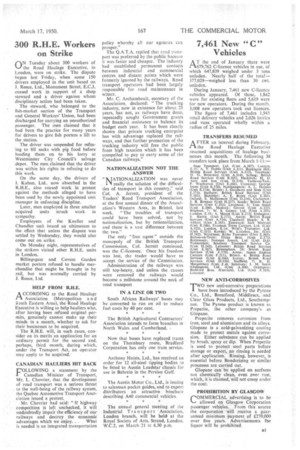300 . R.H.E. Workers on Strike r-IN Tuesday about 300 workers
Page 35

If you've noticed an error in this article please click here to report it so we can fix it.
of ka the Road Haulage Executive, in London, were on strike. The dispute began last Friday, when some 150 drivers employed in the unit based on J. Reece, Ltd., Monument Street, E.C.3, ceased work in support of a shop steward and a driver against whom disciplinary action had been taken.
The steward, who belonged to the fish-market section of the Transport and General Workers' Union, had been
discharged for carrying an unauthorized passenger. The men claimed that it had been the practice for many years for drivers to give fish porters a lift to the station.
The 'driver was suspended for refusing to fill sacks with pig food before loading them on to his lorry at Westminster City Council's salvage depot. The men claimed that the driver was within his rights in refusing to do this work.
On the same day, the drivers of Kahan, Ltd., now absorbed in the R.H.E., also ceased work in protest against the methods alleged to have been used by the newly appointed unit manager in enforcing discipline.
Later, men employed in three smaller acquired units struck work in sympathy.
Employees of the Kindler and Chandler unit issued an ultimatum to the effect that unless the dispute was settled by Wednesday, they would also come out on strike.
On Monday night, representatives of the strikers visited other R.H.E. units in London.
Billingsgate and Covent Garden market porters refused to handle mer chandise that might be brought in by rail, but was normally carried by J. Reece, Ltd.
• HELP FROM R.H.E.
A CCORDING to the Road Haulage .1-1 Association (Metropolitan a n d .r:outh Eastern Area), the Road Haulage Executive is willing to help hauliers who, after having been refused original permits, genuinely cannot make up their minds in a month, whether to ask for their businesses to be acquired.
The R.1-1.E, will, in such cases, consider on its merits an application for an ordinary permit for the second and, perhaps, third month, during which, under the Transport Act, an operator may apply to be acquired:
CANADIAN HAULIERS HIT BACK
VOLLOWING a statement by the 1 Canadian Minister of Transport, Mr, L. Chevrier, that the development of road transport was a serious threat to the well-being of the railway system. the Quebec Automotive Transport Association issued a protest.
Mr. Chevrier had said: "If highway competition is left unchecked, it will undoubtedly impair the efficiency of our railways and destroy the economic advantages which we enjoy. • , What is needed is an integrated transportation policy whereby all our agencies can prosper."
The Q.A.T.A. replied that road transport was preferred by the public because it was faster and cheaper. The industry had established permanent contacts between industrial and commercial centres and distant points which were formerly ignored by the railways. Road transport operators had been largely responsible for road maintenance in winter.
Mr. C. Archambault, secretary of the Association, declared: "The trucking industry, now in existence fo'r about 25 years, has not, as railways have done, repeatedly sought Government grants and financial assistance to balance its budget each year. It has been clearly shown that private trucking enterprise has with advantage replaced the railways, and that farther promotion of the trucking industry will free the public from high taxation which it has been compelled to pay to carry some of the Canadian railways."
NATIONALIZATION NOT THE ANSWER
" MATIONALIZATION was never
really the solution of the difficulties of transport in this country,': said Col. A. Jerrett, president of the Traders' Road Transport Association, at the first annual dinner of the Association's Western Area, in Bristol. last week. "The troubles of transport could have been solved, not by nationalization, but by rationalization, and there is a vast difference between the two."
[he only "free agent" outside the monopoly of the British Transport Commission, Col. lerrett continued, was the C-licensee. Once his freedom was lost, the trader would have to accept the service of the Commission.
Administration of the railways was still top-heavy, and unless the causes were removed the railways would become a millstone around.the neck of road transport.
IN A LINE OR TWO
South African Railways' buses may be converted to run on oil . to reduce fuel costs by 40 per cent.
The British Agricultural Contractors' Association intends to form branches in North Wales and Cumberland. , *
Now that buses have replaced trams on the Thornbury route, Bradford Corporation has only one tram service. *
Anthony Hoists, Ltd., has received an order for 12 alt-steel tipping bodies to be fitted to Austin Loadstar chassis for use in Bahrein in the Persian Gulf.
The Austin Motor Co., Ltd., is issuing to salesman pocket guides, and to export distributors an attractive brochure describing A40 commercial vehicles.
The annual general meeting, of the Industrial Transport Association, London branch, will be held at the Royal Society of Arts, Strand, London. W.C.2, on March 21 at 6.30 p.m.




























































































